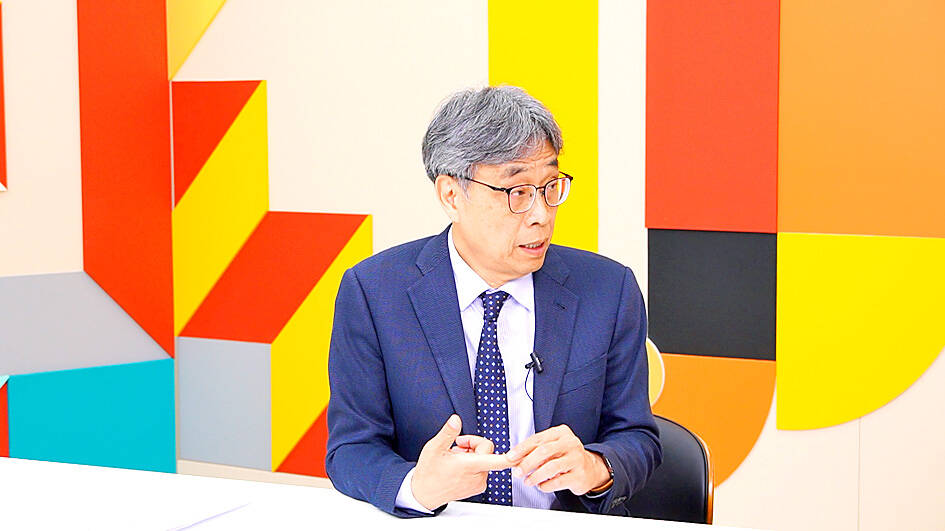To give farmers more autonomy in product pricing, the Ministry of Agriculture is instituting a system to promote contract farming and bring produce directly to hypermarkets, Minister of Agriculture Chen Junne-jih (陳駿季) said yesterday.
Currently, agricultural prices are mainly set by intermediaries who sell at wholesale markets, the ministry said.
Dealers purchasing produce is the main reason for wildly fluctuating prices and excess production of crops as growers race to plant the previous season’s cash crops, it said.

Photo: Chang Chia-juei, Taipei Times
In an interview with the Liberty Times (sister paper of the Taipei Times), Chen said that production should determine price.
There must be a way for growers to assess the live price of agricultural goods and the amount already planted to decide whether to continue a crop, he said.
The ministry has relied on local township officials to report farming information, but that data might be inaccurate, he said.
The ministry is to hire investigators to analyze statistics and other information to better understand what is planted on arable land nationwide, he said.
The work would be assisted by satellite imagery and aerial drone photography so the ministry would have the most accurate information, which growers could use to help them make decisions, he said.
Most growers in Taiwan are single entities and do not consider sales when planting, Chen said, adding that the ministry is attempting to change that by encouraging group cultivation, with groups selecting the most beneficial crop according to the ministry’s real-time information.
Other benefits of group cultivation include more people shouldering the costs, a general decrease in operational overhead and more thorough pest prevention, he said.
Produce from group farms would be sold directly to supermarkets or convenience stores, removing intermediaries so growers would get a bigger cut, Chen said.
As supermarkets and convenience stores pay via check, the ministry is offering assistance for growers’ associations or cooperatives to forward payments to growers immediately and receive payment from stores later, the ministry said.
The Agricultural Bank would ensure that all such platforms have good credit and ample cash flow, the ministry said.
Group cultivation and contract farming would bring many benefits, including the revitalization of farming communities with an influx of sales and accounting talent and other workers, Chen said.
This gives young people a role in farming even if they are not working the land themselves, he said.
The ministry would also keep data on unused land and consider establishing elderly care centers on it so young people would not have to worry about their elderly family members at home, he added.

Chinese Nationalist Party (KMT) Chairman Eric Chu (朱立倫), spokeswoman Yang Chih-yu (楊智伃) and Legislator Hsieh Lung-chieh (謝龍介) would be summoned by police for questioning for leading an illegal assembly on Thursday evening last week, Minister of the Interior Liu Shyh-fang (劉世芳) said today. The three KMT officials led an assembly outside the Taipei City Prosecutors’ Office, a restricted area where public assembly is not allowed, protesting the questioning of several KMT staff and searches of KMT headquarters and offices in a recall petition forgery case. Chu, Yang and Hsieh are all suspected of contravening the Assembly and Parade Act (集會遊行法) by holding

PRAISE: Japanese visitor Takashi Kubota said the Taiwanese temple architecture images showcased in the AI Art Gallery were the most impressive displays he saw Taiwan does not have an official pavilion at the World Expo in Osaka, Japan, because of its diplomatic predicament, but the government-backed Tech World pavilion is drawing interest with its unique recreations of works by Taiwanese artists. The pavilion features an artificial intelligence (AI)-based art gallery showcasing works of famous Taiwanese artists from the Japanese colonial period using innovative technologies. Among its main simulated displays are Eastern gouache paintings by Chen Chin (陳進), Lin Yu-shan (林玉山) and Kuo Hsueh-hu (郭雪湖), who were the three young Taiwanese painters selected for the East Asian Painting exhibition in 1927. Gouache is a water-based

Taiwan would welcome the return of Honduras as a diplomatic ally if its next president decides to make such a move, Minister of Foreign Affairs Lin Chia-lung (林佳龍) said yesterday. “Of course, we would welcome Honduras if they want to restore diplomatic ties with Taiwan after their elections,” Lin said at a meeting of the legislature’s Foreign Affairs and National Defense Committee, when asked to comment on statements made by two of the three Honduran presidential candidates during the presidential campaign in the Central American country. Taiwan is paying close attention to the region as a whole in the wake of a

OFF-TARGET: More than 30,000 participants were expected to take part in the Games next month, but only 6,550 foreign and 19,400 Taiwanese athletes have registered Taipei city councilors yesterday blasted the organizers of next month’s World Masters Games over sudden timetable and venue changes, which they said have caused thousands of participants to back out of the international sporting event, among other organizational issues. They also cited visa delays and political interference by China as reasons many foreign athletes are requesting refunds for the event, to be held from May 17 to 30. Jointly organized by the Taipei and New Taipei City governments, the games have been rocked by numerous controversies since preparations began in 2020. Taipei City Councilor Lin Yen-feng (林延鳳) said yesterday that new measures by